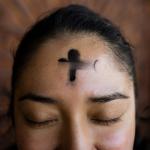After reading my fellow blogger Julia Smucker’s piece about the implication of wearing our ashes on Ash Wednesday, I thought I would share a curious variant that I encountered in Lisbon. I am here for business and since there was no English language alternative for Ash Wednesday, my wife and I went to the local parish church, Our Lady of the Rosary of Fatima, for the evening service. As we were waiting to queue up to receive our ashes, I was studying the people returning and was surprised to not see the traditional black cross/smudge on their foreheads–as the recent meme put it, perhaps Father was low on toner:

However, as I got closer, I noticed two things: first, the priests appeared to be making the sign of the cross on the tops of people’s heads, and not on their foreheads. And two bald men who I saw coming back had noticeable ash blobs on the crown of their heads. And, reaching the front of the line, and receiving my ashes, I discovered that the priests were making the sign of the cross and sprinkling a copious amount of ash on my head.
It did feel odd, afterwards, to not have a black cross visible on my forehead. Once I was away from the doors of the church I was once again anonymous in my faith (my Franciscan tau cross being hidden by my sweatshirt). I was not bound, as Julia put it, “to quietly stand up and be counted as a member of the body, for better or for worse.” My faith remained private unless I deliberately chose to make it public.
I am not sure what to make of this practice. It is definitely scriptural, since the Old Testament repeatedly talks about sprinkling ashes on ones head as a sign of repentance: see 2 Samuel 13:19, Judith 4:11, 1 Maccabees 3:47, Ezekiel 27:30. And it does overcome the tension that arises from the strict injunction from Jesus in the gospels:
“And whenever you fast, do not look dismal, like the hypocrites, for they disfigure their faces so as to show others that they are fasting. Truly I tell you, they have received their reward. But when you fast, put oil on your head and wash your face,so that your fasting may be seen not by others but by your Father who is in secret; and your Father who sees in secret will reward you.” (Mt 6:16-18, NRSVCE, emphasis added.)
But, at the same time there is something to be said about having a moment in which all Catholics (including many who rarely attend mass otherwise) publicly profess their faith. It is a sign that makes us signs, a visible presence, however fleeting, of a transcendent reality that much of the secular world ignores. Moreover, with an eye on the tumult surrounding Fiducia Supplicans, the ashes are a visible sign of a blessing bestowed on anyone who approaches the Church. You might quibble that being marked with ashes is not a blessing, per se. But I feel blessed to receive them: the call to “turn away from sin and believe the Gospel” is as much a gift of grace as the traditional Franciscan blessing: “May the Lord bless you and keep you, may He turn his face towards you and be merciful to you, and may He grant you his peace.”
Like all blessings, whether marked with ashes on my forehead, or have them anonymously hidden in my hair, the real question is whether I am open to the grace being offered. May your Lenten discipline make you more open to what the Lord is offering you: a peace and joy beyond all understanding.
Cover image: Julian Falat, Ash Wednesday; image in public domain.













